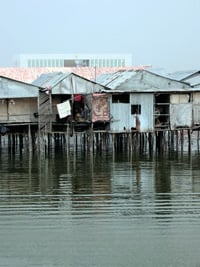
Confronting the end of a minority community in Cambodia
Carl Söderbergh, MRG’s Director of Policy and Communications is shocked by the gradual infilling of an iconic lake in Phnom Penh to make way for a commercial development, to the detriment of Cambodia’s Cham minority.
Traffic in Phnom Penh is frenetic at times. With few stoplights or pedestrian crossings, life on foot can feel precarious. When I asked my Cambodian hosts about this, they explained that I should just walk slowly across the crowded intersections, allowing the cars and the motorcycle rickshaws (or “tuk-tuks”) to manoeuvre around. As long as I walk in a straight line and at a steady pace, I should be fine, they reassured me. This turned out to be true, although every time I tried it, I could feel my heart racing. It all felt a little bit too much like a computer game – with me as the target.

One afternoon, I found myself in a totally different atmosphere. Two or three turnings off of one of the most busy avenues of the city and the intense pace of Phnom Penh suddenly felt very far away. I was sitting in an alley-way, talking with Cham minority shop-keepers. Just behind us were rows of houses on stilts, lining Boeung Kak Lake. In a little while, the sun would be setting behind the opposite shore. It was a lovely setting for an afternoon chat. Unfortunately, our conversation was tinged with sadness.
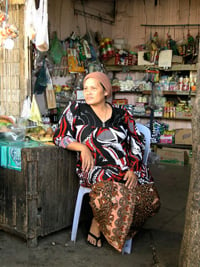
As part of the Minority Voices programme, MRG staff are arranging media training courses for minority rights activists in Africa, Asia and Latin America. I was in Phnom Penh, in order to help with the course which we held there. As part of their training, participants choose a minority or indigenous rights issue to focus on when learning how to make documentary films. One group decided to make a film about the evictions that are currently taking place from around Boeung Kak Lake in Phnom Penh. As land evictions are a pressing issue for minorities and indigenous peoples throughout South-East Asia, I accompanied the group to learn more.
In 2007, the Korean corporation Shukaku was awarded a 99-year lease for the lake. In order for this to happen, the Cambodian government pushed through a change in legislation, allowing the lake to be reclassified as state private land (as opposed to state public land, which is protected). Sao Sotheary, an impassioned programme manager with Bridges Across Borders, explained the background to the case. Sotheary said, “Generally, this would be illegal, since the lease agreement was signed under the prior classification. Also, there needed to be time to study – it happened overnight.”
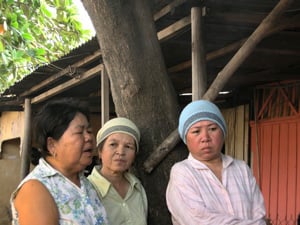
What has since occurred is frankly shocking. According to Sotheary, approximately 1,000 of the 4,225 families living along the lake have already been displaced. They have been given two options – either to move into concrete bungalows some 20 kilometers away, or accept USD 8,500 in compensation. The trouble is that USD 8,500 will not get families decent accommodation anywhere near the centre of Phnom Penh, and the vital job opportunities that are available there. The houses are in Dam Nak Tro Yeung, an area without a proper water supply, or school or health care facilities. Sotheary has interviewed families who accepted the housing offer and whose standard of living has clearly declined. Women face difficulties running their small businesses and men can no longer earn a decent income as tuk-tuk drivers. Sotheary has gathered testimonies that show that domestic violence has increased among the evicted families.
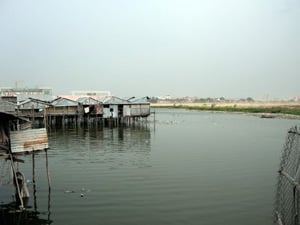
My heart sank when we went through one of the houses and got a clear view across the lake. Approximately 70-80 per cent is now filled in, and a sandbar stretches right across what had previously been one of the most famous vistas of the city. Wind blew sand in our faces. There was little chance that the fishing that had sustained the lake-shore community for generations could go on for much longer.
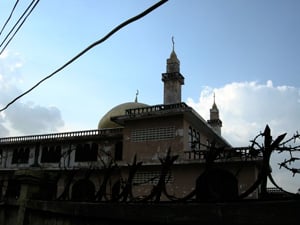
Cham are a Muslim minority in Cambodia. Once the Cham families are gone, the nearby mosque is expected to be torn down to make way for the apartments, the supermarket and the shopping centre planned by Shukaku. As one of the shop-keepers said, their connection to the mosque will soon be gone.
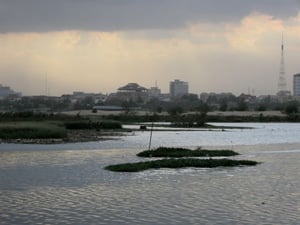
Looking out across the rapidly dwindling lake, I reflected on the fact that minority rights have as much to do with preserving connections to specific locations as with national legislation and government policies. The odd thing about all this is of course – what is meant to happen after the 99-year lease expires? The lake will have disappeared forever. No longer will people, like myself, be able to find respite from the intensity of Phnom Penh life.
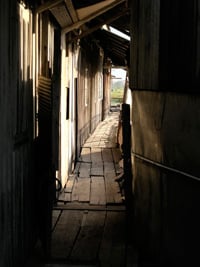
The evictions from Boeung Kak Lake are not solely a minority issue. There are many ethnic Khmer families who have been forced to move as well. Moreover, the lake is important for the whole of the Phnom Penh, as it absorbs flood-water during the seasonal monsoons. However, the destruction of the lake spells the end of a particular minority community and a unique way of urban life.
—
To learn more about Bridges Across Borders, see their website.
This article reflects the sole opinion of its author and does not engage MRG’s responsibility.